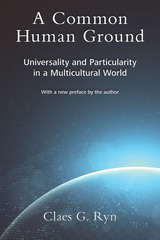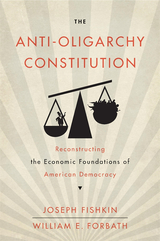2 books about Universals (Philosophy)

A Common Human Ground
Universality and Particularity in a Multicultural World
Claes G. Ryn
University of Missouri Press, 2019
A great challenge of the twenty-first century is the danger of conflict between persons, peoples, and cultures, among and within societies. In A Common Human Ground, Claes Ryn explores the nature of this problem and sets forth a theory about what is necessary for peaceful relations to be possible.
Many in the Western world trust in “democracy,” “capitalism,” “liberal tolerance,” “scientific progress,” or “general enlightenment” to handle this problem. Although each of these, properly defined, may contribute toward alleviating disputes, Ryn argues that the problem is much more complex and demanding than is usually recognized. He reasons that, most fundamentally, good relations among individuals and nations have moral and cultural preconditions.
What can predispose them to mutual respect and peace? One Western philosophical tradition, for which Plato set the pattern, maintains that the only way to genuine unity is for historical diversity to yield to universality. The implication of this view for a multicultural world would be a peace that requires that cultural distinctiveness be effaced as far as possible and replaced with a universal culture. A very different Western philosophical tradition denies the existence of universality altogether. It is represented today by postmodernist multiculturalism—a view that leaves unanswered the question as to how conflict between diverse groups might be averted.
Ryn questions both of these traditions, arguing for the potential union of universality and particularity. He contends that the two need not be enemies, but in fact need each other. Cultivating individual and national particularities is potentially compatible with strengthening and enriching our common humanity. This volume embraces the notion of universality, while at the same time historicizing it.
Using wide-ranging examples, Ryn presents a firmly sustained and systematic argument centering on this central issue. His approach is interdisciplinary, discussing not only political ideas, but also fiction, drama, and other arts. Scholarly and philosophical, but not specialized, this book will appeal to general readers as well as intellectuals.
[more]

Universals
Studies in Indian Logic and Linguistics
Frits Staal
University of Chicago Press, 1988
This collection of articles and review essays, including many hard to find pieces, comprises the most important and fundamental studies of Indian logic and linguistics ever undertaken.
Frits Staal is concerned with four basic questions: Are there universals of logic that transcend culture and time? Are there universals of language and linguistics? What is the nature of Indian logic? And what is the nature of Indian linguistics? By addressing these questions, Staal demonstrates that, contrary to the general assumption among Western philosophers, the classical philosophers of India were rationalists, attentive to arguments. They were in this respect unlike contemporary Western thinkers inspired by existentialism or hermeneutics, and like the ancient Chinese, Greeks, and many medieval European schoolmen, only—as Staal says—more so. Universals establishes that Asia's contributions are not only compatible with what has been produced in the West, but a necessary ingredient and an essential component of any future human science.
Frits Staal is concerned with four basic questions: Are there universals of logic that transcend culture and time? Are there universals of language and linguistics? What is the nature of Indian logic? And what is the nature of Indian linguistics? By addressing these questions, Staal demonstrates that, contrary to the general assumption among Western philosophers, the classical philosophers of India were rationalists, attentive to arguments. They were in this respect unlike contemporary Western thinkers inspired by existentialism or hermeneutics, and like the ancient Chinese, Greeks, and many medieval European schoolmen, only—as Staal says—more so. Universals establishes that Asia's contributions are not only compatible with what has been produced in the West, but a necessary ingredient and an essential component of any future human science.
[more]
READERS
Browse our collection.
PUBLISHERS
See BiblioVault's publisher services.
STUDENT SERVICES
Files for college accessibility offices.
UChicago Accessibility Resources
home | accessibility | search | about | contact us
BiblioVault ® 2001 - 2024
The University of Chicago Press









